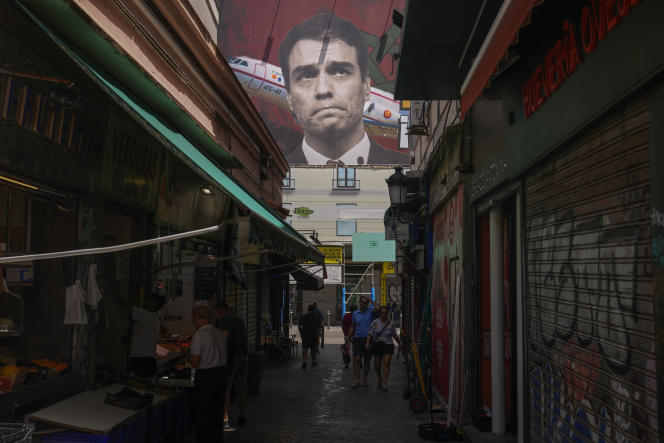“España goes like a motorcycle. » Understand: “Spain is going full throttle. » The head of the Spanish government, Socialist Pedro Sanchez, has been repeating this ever since he called early general elections for Sunday 23 July. While he is attacked by the right-wing opposition on the political agreements sealed in recent years with his coalition partner of the radical left Unidas Podemos, or with the separatists of the Independentist Left of Catalonia, he has bet on his economic record to try to make the polls lie, which anticipate a victory for the People’s Party (PP, right). If the forecasts are confirmed, it would be the first time that the Spanish Socialist Workers’ Party (PSOE) would lose power without the kingdom going through an economic crisis.
After five years at the head of the executive, Mr. Sanchez therefore recounts his successes during meetings and on television sets. His government has increased the minimum wage by nearly 47% since taking power in June 2018. He has also reindexed pensions to inflation, allowing for an 8% increase in 2023, and reformed the “labour” law in order to limit the use of precarious contracts. Thus, the proportion of fixed-term jobs fell from 26% to 17%.
In addition, nearly 2 million jobs have been created and unemployment has fallen by two points, even though it remains one of the highest in the European Union, at 13.3% of workers. Inflation fell to 1.9% in June, below the 2% target set by the European Central Bank (ECB). And gross domestic product (GDP), which jumped 5.5% in 2022, is expected to grow a further 2.3% in 2023, double the expected European average.
However, if we are to believe the opinion polls, the message is not getting through. Not only is the economy not the main theme of the campaign, but, “behind the good macroeconomic results, living conditions are not so goodunderlines the vice-president of the government and minister of labor, Yolanda Diaz, candidate of the movement of the alternative left Sumar, which brings together about fifteen parties to the left of the PSOE. “Inflation hits those who have the least. The cost of living has increased and health and education professionals have been exhausted since the pandemic [de Covid-19]. »
“Inequalities have increased”
In the street, during family reunions or on the terraces of cafés with friends, rising prices are fueling discussions and worrying the middle and working classes. Because if inflation has fallen below 2%, in particular thanks to the abolition of VAT on certain foods, in accumulation, since 2018, prices have increased by almost 30% and the electricity bill has inflated by 40%, despite the “Iberian exception”, a mechanism allowing the price of gas to be capped.
You have 55.88% of this article left to read. The following is for subscribers only.
